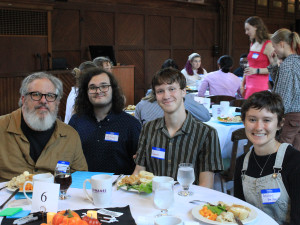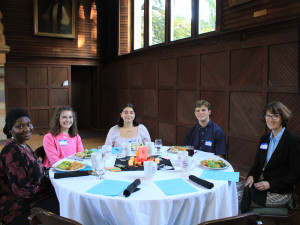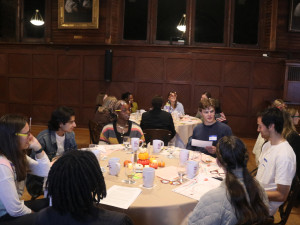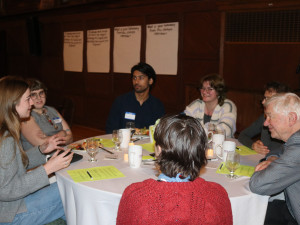In today’s fast-paced world, where schedules dominate and distractions are endless, the simple act of sharing a meal and engaging in meaningful conversation has become a rare gift. At Sewanee, Dinner & Dialogue is designed to rekindle the power of connections—one plate and one conversation at a time.
At its core, Dinner & Dialogue is about more than food. It is an intentional gathering where individuals come together to share perspectives, exchange ideas, and build understanding through thoughtful discussion. Whether exploring our values, approaches to issues, or personal experiences, these conversations create a space for reciprocal engagement in a welcoming and respectful environment.
It is an intentional gathering where individuals come together to share perspectives, exchange ideas, and build understanding through thoughtful discussion. Whether exploring our values, approaches to issues, or personal experiences, these conversations create a space for reciprocal engagement in a welcoming and respectful environment.
 Four Dinner & Dialogue events were held in the AY 2024-2025. Our first forum asked: How do we live out our value of EQB in this election season? From participants’ responses, the value of EQB inspires a commitment to community, respect, and holding unity amidst differences together, which requires intentional efforts. Listening to understand, recognizing shared personhood, and bridging differences in an effort to maintain communal relationships all serve to foster respectful conversations across political divides. By embracing these intentions, the Sewanee community can continue to strengthen connections and navigate political differences with hope and shared purpose.
Four Dinner & Dialogue events were held in the AY 2024-2025. Our first forum asked: How do we live out our value of EQB in this election season? From participants’ responses, the value of EQB inspires a commitment to community, respect, and holding unity amidst differences together, which requires intentional efforts. Listening to understand, recognizing shared personhood, and bridging differences in an effort to maintain communal relationships all serve to foster respectful conversations across political divides. By embracing these intentions, the Sewanee community can continue to strengthen connections and navigate political differences with hope and shared purpose.
Ahead of the Thanksgiving holiday, our second Advent 2024 event provided a lighthearted environment—completed with fun masks and coloring sheets—to role-play difficult conversations at the Thanksgiving table. When reflecting on skills for deeper dialogue, participants prioritized active listening, curiosity, and dialogue strategies to foster meaningful exchanges rather than debates. They sought to improve their ability to ask non-confrontational, open-ended questions, embrace silence, and ensure all voices are heard—strengthening connections even across opposing viewpoints.
our second Advent 2024 event provided a lighthearted environment—completed with fun masks and coloring sheets—to role-play difficult conversations at the Thanksgiving table. When reflecting on skills for deeper dialogue, participants prioritized active listening, curiosity, and dialogue strategies to foster meaningful exchanges rather than debates. They sought to improve their ability to ask non-confrontational, open-ended questions, embrace silence, and ensure all voices are heard—strengthening connections even across opposing viewpoints.
In February 2025, Dinner & Dialogue took up the question, “What’s the value of a liberal arts education anyway?” Participants highlighted the interdisciplinary approach of a liberal arts education as one of its greatest benefits, allowing them to broaden their perspectives and engage in critical discussions across various disciplines. Many appreciated the strong sense of community, emphasizing the role of meaningful relationships and speaking and listening in preparing students to engage with diverse perspectives. The connections between students, faculty, staff, and alumni were also seen as a key factor in fostering lifelong learning. Regarding challenges, cost and career uncertainty were the primary concerns, with some noting that traditional career tracks might offer clearer pathways. Others pointed out that attending a smaller liberal arts institution could limit exposure to real-world experiences. Academic requirements and the broader perception of liberal arts degrees also posed difficulties for some students.
Many appreciated the strong sense of community, emphasizing the role of meaningful relationships and speaking and listening in preparing students to engage with diverse perspectives. The connections between students, faculty, staff, and alumni were also seen as a key factor in fostering lifelong learning. Regarding challenges, cost and career uncertainty were the primary concerns, with some noting that traditional career tracks might offer clearer pathways. Others pointed out that attending a smaller liberal arts institution could limit exposure to real-world experiences. Academic requirements and the broader perception of liberal arts degrees also posed difficulties for some students.
Our final Dinner & Dialogue framed discussion by exploring the balance between free speech and inclusion, emphasizing their potential to coexist and foster meaningful dialogue. Participants highlighted challenges such as demographic isolation, conflict avoidance, and social ostracization within Sewanee’s small campus. Broader concerns about national political tensions also surfaced, with some noting how polarization can hinder productive conversations. Despite these challenges, participants saw opportunities within Sewanee’s diverse campus culture, strong community relationships, and liberal arts curriculum, all of which encourage dialogue across perspectives. Many emphasized the importance of perspective-taking, curiosity, and embracing discomfort to foster respectful discourse. Additionally, educators play a crucial role in setting expectations for self-reflection and meaningful discussion, ensuring that learning environments remain open and inclusive. Ultimately, participants advocated for prioritizing understanding over divisive speech, creating a campus culture rooted in engagement and accountability.
By the numbers, across four events, 155 participants shared dinner together, including 95 students, 31 faculty, 19 staff, 2 members of the Vice Chancellor’s Cabinet, 1 Seminarian, and 7 additional guests. To support conversations, 26 students facilitated one or more forums (or took notes at the final Dinner & Dialogue).
Dinner & Dialogue was made possible through the generous support of All Saints’ Chapel; the Division of Diversity, Equity, and Inclusion; the Division of Student Life and Campus Involvement; and the Center for Leadership, as well as many campus collaborators who shared the invitation widely.
The beauty of Dinner & Dialogue lies in its simplicity. All it requires is a meal, an open mind, and a willingness to listen. As participants share insights and challenge ideas, a deeper sense of connection emerges—one that lingers long after the last bite. In an era dominated by digital interactions, the opportunity to sit face-to-face, listen, and engage authentically is invaluable. Because in the end, the most nourishing part of the meal isn't just the food—it's the conversation that shapes us all.

